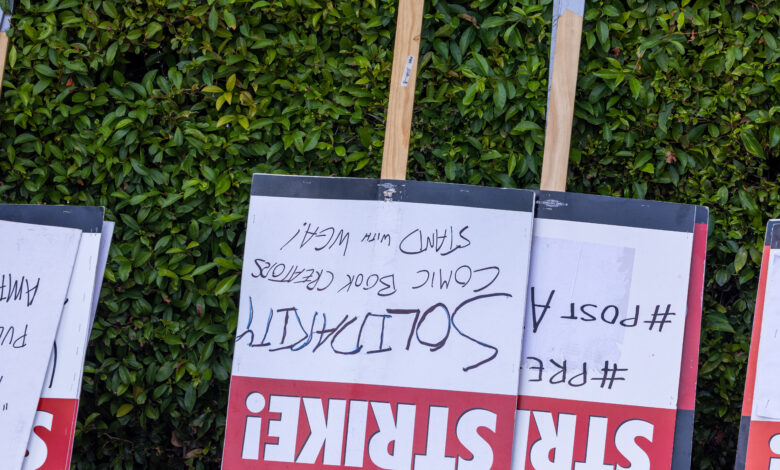End in Sight: US Writers’ Strike Nears Resolution, but Actors’ Battle Continues

After 146 days of crippling strikes that have left the entertainment industry reeling and fans anxiously awaiting their beloved shows, a tentative deal has been reached between screenwriters and studios in the United States. The resolution marks a significant step towards normalcy in Hollywood, but a parallel strike by actors continues to cast uncertainty over the industry.
This strike, the longest to hit Hollywood in decades, disrupted numerous productions and sent shockwaves through the world of entertainment. With a tentative agreement in sight, writers are poised to return to work, potentially leading to some TV shows resuming production as early as next month.
The most likely beneficiaries of this imminent return to work include shows like “The Last of Us,” “Billions,” “Stranger Things,” “The Handmaid’s Tale,” “Hacks,” “Severance,” “Yellowjackets,” and “Abbott Elementary.” However, the ongoing actors’ strike will still delay the production of some of these series.
The initial beneficiaries of this deal will be shows that do not heavily rely on actors, such as daytime and late-night talk shows. Jimmy Kimmel, Jimmy Fallon, Stephen Colbert, and Seth Meyers, among others, are expected to make a return to screens as early as October. Daytime programs like “The Drew Barrymore Show,” “The Jennifer Hudson Show,” and “The Talk” are also likely to resume shortly due to having their productions in readiness.
However, the resurrection of TV dramas and comedies, including many fan favorites, will take longer. This delay results from the complexities associated with restarting large-scale productions and the lingering effects of the actors’ strike.
In the writers’ corner, the Writers Guild’s chief negotiator, Ellen Stutzman, led the charge, while Carol Lombardini, the president of the Alliance of Motion Picture and Television Producers (AMPTP), represented the studios, production companies, and streaming services. Disney CEO Bob Iger, NBCUniversal chair Donna Langley, Warner Bros Discovery CEO David Zaslav, and Netflix co-CEO Ted Sarandos also played pivotal roles in restarting talks with writers.
While the precise terms of the deal remain undisclosed until finalized, the Writers Guild seems to have achieved many of its primary demands. These include increased royalties from streaming content and concessions on minimum staffing levels for shows. The negotiations also tackled the thorny issue of artificial intelligence (AI) in the industry, with the Writers Guild securing guarantees that AI will not affect writers’ credits and compensation.
The end of the writers’ strike does not impact the concurrent strike by 160,000 members of the Screen Actors Guild-American Federation of Television and Radio Artists (SAG-AFTRA). This strike, initiated in July over similar pay and AI-related disputes, continues without immediate resolution. SAG-AFTRA praised the Writers Guild’s “strength, resiliency, and solidarity” while urging studios and streaming services to return to negotiations to secure a fair deal for their members.
While one chapter in Hollywood’s labor disputes may be coming to an end, another is still unfolding, and the entertainment industry, along with its loyal audiences, watches with bated breath.





